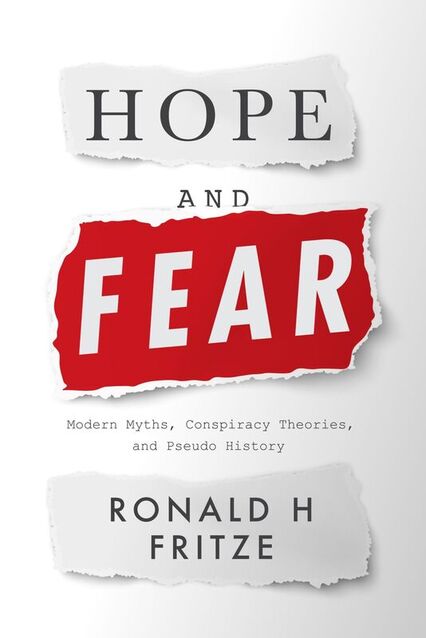
TITLE: Hope and Fear
AUTHOR: Ronald H Fritze
PUBLISHER: Reaktion Books
ISBN: 9781789145397
PODCAST EPISODE: None
REVIEWER: Hilary Wilson
Reaktion Books is a publisher well-known for delivering accessible, scholarly books on a wide variety of complex subjects. I have always been impressed with their output, and this title did not disappoint. Hope and Fear: Modern Myths, Conspiracy Theories, and Pseudo-History, out in the UK on February 14th, 2022, provides a nuanced look into the difficult topic of conspiracy theories. It tackles both why people believe in those theories and how they continue to thrive up into the modern day when it is widely-known that their very foundations are false.
Ronald H. Fritze, a professor of both history and religion at Athens State University, is uniquely suited to write about this topic considering how far back in history conspiracy theories have thrived and their tendency to be wrapped up in the vagaries of religious belief. Fritze’s history expertise allows him to enlighten the reader with the reasons how and why the theories have continued to grow and change within modern day.
From the start, Fritze takes care to define a variety of terms used by conspiracy theorists and academics alike. Additionally, he also highlights the common hallmarks of conspiracism to allow the reader to then separate fact from fiction within their own life. Fritze then dissects three conspiracy theories that have had massive impacts on history over the ages: the Lost Tribes of Israel, occult beliefs’ influences on Nazi policy, and the Roswell Incident.
While Fritze writes from a place of disdain for all conspiratorial thinking, he is upfront about that perspective, making a compelling case for how entertaining “Junk Knowledge” can often become a slippery slope. Nevertheless, Fritze does a wonderful job sharing how such knowledge proliferates and what belief in it offers to believers. For instance, the Roswell Incident section illuminates the original story of the crash and how disinterested the UFO community was in it until decades later. Promoting the idea that the crash was extraterrestrial in nature benefited the inhabitants of Roswell financially and socially, while reinforcing those more inclined towards conspiracy thinking inherent distrust in authority.
Hope and Fear is a worthwhile book that will allow readers to view the world through a more skeptical lens. Fritze adroitly outlines the ways in which the stories communities tell about themselves and others can be used for ill. It is only through recognizing these mechanisms that Junk Knowledge can be avoided so that the future won’t continue to echo the past.
AUTHOR: Ronald H Fritze
PUBLISHER: Reaktion Books
ISBN: 9781789145397
PODCAST EPISODE: None
REVIEWER: Hilary Wilson
Reaktion Books is a publisher well-known for delivering accessible, scholarly books on a wide variety of complex subjects. I have always been impressed with their output, and this title did not disappoint. Hope and Fear: Modern Myths, Conspiracy Theories, and Pseudo-History, out in the UK on February 14th, 2022, provides a nuanced look into the difficult topic of conspiracy theories. It tackles both why people believe in those theories and how they continue to thrive up into the modern day when it is widely-known that their very foundations are false.
Ronald H. Fritze, a professor of both history and religion at Athens State University, is uniquely suited to write about this topic considering how far back in history conspiracy theories have thrived and their tendency to be wrapped up in the vagaries of religious belief. Fritze’s history expertise allows him to enlighten the reader with the reasons how and why the theories have continued to grow and change within modern day.
From the start, Fritze takes care to define a variety of terms used by conspiracy theorists and academics alike. Additionally, he also highlights the common hallmarks of conspiracism to allow the reader to then separate fact from fiction within their own life. Fritze then dissects three conspiracy theories that have had massive impacts on history over the ages: the Lost Tribes of Israel, occult beliefs’ influences on Nazi policy, and the Roswell Incident.
While Fritze writes from a place of disdain for all conspiratorial thinking, he is upfront about that perspective, making a compelling case for how entertaining “Junk Knowledge” can often become a slippery slope. Nevertheless, Fritze does a wonderful job sharing how such knowledge proliferates and what belief in it offers to believers. For instance, the Roswell Incident section illuminates the original story of the crash and how disinterested the UFO community was in it until decades later. Promoting the idea that the crash was extraterrestrial in nature benefited the inhabitants of Roswell financially and socially, while reinforcing those more inclined towards conspiracy thinking inherent distrust in authority.
Hope and Fear is a worthwhile book that will allow readers to view the world through a more skeptical lens. Fritze adroitly outlines the ways in which the stories communities tell about themselves and others can be used for ill. It is only through recognizing these mechanisms that Junk Knowledge can be avoided so that the future won’t continue to echo the past.